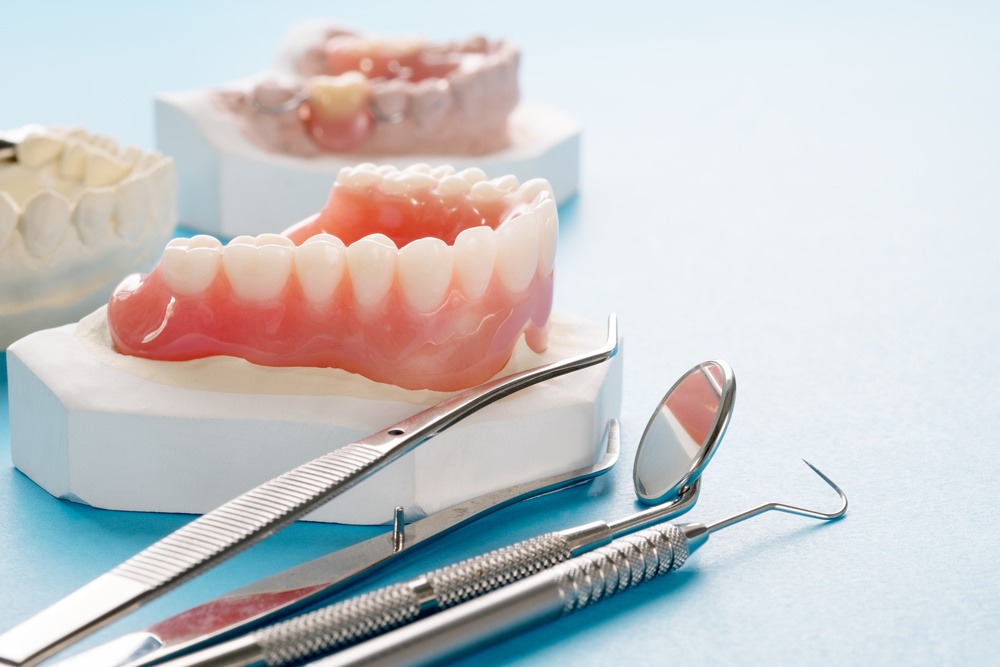
Dentures may be the ideal way to restore a person’s smile and confidence. If you recently received dentures, getting used to the new prosthetics in your daily life may take some time. New dentures bring a few inconveniences that you should be ready to face. For most, the mouth may feel sore, or you’ll start to produce more saliva than usual.
Generally, there’s an adjustment period if you’re going to wear dentures for the first time. In most cases, it’s likely to last for a few weeks or so. As part of the adjustment period, it’s also best to know a thing or two about how dentures work.
How Do Dentures Work?
If you have missing teeth, dentures may be a replacement option. Dentures are synthetic prosthetics that aren’t fixed permanently in your mouth. Although it takes time to get used to wearing one, along with some lifestyle changes, dentures are a good choice for many.
Today, dentures are available as full or partial. A full denture works by serving as the replacement for all teeth and covering the gums completely. A partial denture is customised to replace some or a few missing teeth. Dentures are designed based on the patient’s measurements to ensure a secure and comfortable fit. If you’re eager to know more about dentures, you might want to try this site to learn more, especially if it’s your first time wearing one.
Tips For New Denture Wearers
As long as you carefully follow the instructions on using one, getting used to life with dentures won’t be difficult. If you have any concerns with your brand-new dentures, you can ask your dentist if you have any concerns. Aside from your dentist’s instructions, here are several tips to remember to ensure the adjustment period is hassle-free.
1. Plan Out Your Meals
Eating might feel somewhat off during the first few days of wearing dentures. However, this is part of the adjustment period, so you should be patient.
When planning your meals, consider food that’s easy to chew and swallow. Good choices include cooked vegetables, mashed potatoes, fish, yogurt, eggs, pudding, and ice cream. While eating, take smaller bites than usual, and avoid biting hard using your front teeth. Additionally, try to steer clear of chewy food in the meantime.
Eating will be simpler and more natural as your dentures begin to wear down, which can take anywhere from two weeks to three months. At this point, you can incorporate other food into your meals, especially those that require chewing.
2. Deal With Sore Spots
Having new dentures is likely to cause the formation of sore spots within your mouth. Generally, these sore spots are expected during the first few weeks of wearing new dentures. A remedy you can do is to rinse the mouth with warm salt water. Doing so will help lessen inflammation and minimise the discomfort caused by the sore spots.
3. Clean Your Dentures
Keep your dentures clean regularly. Over time, bacteria that cause plaque and odour can accumulate on your dentures, resulting in bad breath, while leftover food particles can stain your dentures.
Remove your dentures and soak in a denture cleanser to eliminate any leftover food and plaque. After soaking, use a soft-bristled brush to give your dentures a good scrub. Thoroughly rinse and store properly.
When not in use, immerse your dentures in water or a denture cleanser solution after cleaning them to keep them moist at all times. Dentures are prone to warping and cracking if they’re allowed to dry out.

4. Observe Oral Hygiene
Aside from your dentures, you should also maintain good oral hygiene. Make it a routine to brush your gums and tongue using a soft-bristled toothbrush. Not brushing daily may allow bacteria to multiply and put you at risk for developing gum disease, especially gingivitis among adults.
It would be best if you also considered having your gums checked at least once a year by your dentist to prevent infection.
5. Practice Your Speech
If speaking is difficult for you while wearing your dentures, that’s normal for first-time users. For most individuals, words containing the ‘s’ and ‘f’ sounds can be difficult to muster. It may be best to practice speaking out loud in front of a mirror and reading out loud. Additionally, a valuable tip to keep in mind is to bite down and consciously swallow right away before speaking as it sets the dentures into the proper position.
6. Use The Right Amount Of Adhesive
For some individuals, the dentures might slip. In such scenarios, you need to use the right amount of adhesive to keep the dentures in place. However, if you have loose dentures, it’s best to see your dentist for adjustments to ensure the right fit.
Final Thoughts
Using dentures for the first time can be both an exhilarating and daunting experience. Most are eager to restore their smile and eat comfortably, while some hesitate about the changes it brings. Regardless of how you see dentures, expect an adjustment period once you start wearing one. Luckily, with the help of these valuable insights, they’ll serve as your guide in making the period manageable.
Hey welcome to my blog . I am a modern women who love to share any tips on lifestyle, health, travel. Hope you join me in this journey!

Speak Your Mind